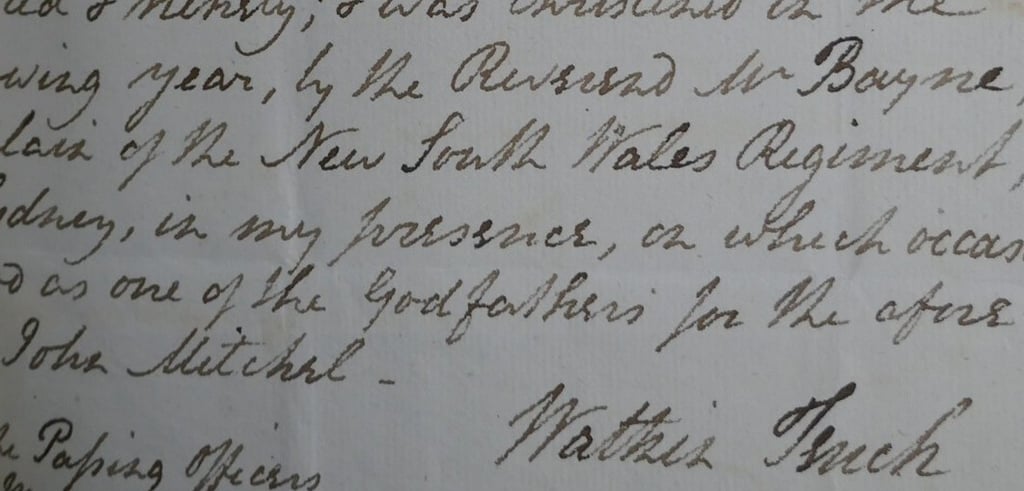A Newly-Discovered Letter by Watkin Tench
Gary L. Sturgess
1/30/20253 min read
John Mitchel was the son of a First Fleet marine officer, Lieutenant John Poulden, and his convict mistress and housekeeper, Mary Mitchell. He was born in April 1790, but not baptised until 14 November 1791, when he was 18 months old.
Little is known about First Fleet baptisms – but in researching Mitchel’s later career, I recently came across a letter from 1810 in which the former First Fleet Marine Captain, Watkin Tench attested to Mitchel’s birth and baptism. He had written, probably at Poulden‘s request, in support of his son’s promotion to lieutenant in the Navy.
Tench wrote that he was one of John Mitchel’s godfathers – Poulden had evidently asked one of his superior officers to provide his son with guidance throughout his life. In which case, the baptism was a public occasion, with a number of other officers and gentlemen present.
We know from the baptismal register that three civil officers also had their children baptised that day – David Collins, the Governor’s official secretary and the Judge Advocate, whose daughter Marianne Letitia Collins by Ann Yeats, was 14 months old; Augustus Alt, the surveyor-general, whose daughter Lucy by Ann George, was 13 months old; and Zachariah Clark, the Assistant Commissary, whose daughter Lydia by Ann Moulton, was 10 months old. All of these women were convicts.
Tench says that the ceremony was performed by the chaplain of the NSW Corps, James Bain, who had arrived two months before on HMS Gorgon. This is also new information – on Bain’s arrival, Reverend Richard Johnson, the colonial chaplain (who had arrived with the First Fleet) had taken the opportunity to go to Norfolk Island to perform marriages and baptisms there, and Bain had stepped in.
We don’t know whether all four christenings were performed at the same ceremony, but it seems likely. There was still no church at this time, and some public building or one of the gentlemen’s houses would have been used. And all four entries were written into the register by James Bain himself in fresh dark ink.
And if there was a public ceremony with a number of the officers and gentlemen present, then the question arises as to whether the boy’s mother was there. We know little about the relationships between the gentlemen and their convict mistresses, but we know that they were awkward.
The gentlemen were obliged to have their names listed in the parish register alongside their children and the mothers of their children, but with the majority of cases, the father also elected to give the child his own surname. In several cases, the mother’s surname was crossed out in the register and the father’s written in above. We know that a number of these men adored these children.
The convict women were not the men’s social equals, and they would not have socialized with them in public. Everyone knew that they were sleeping with the men, but a polite exterior had to be maintained. In government records, the women were often referred to as ‘housekeepers’.
When asked about her place of residence in a Sydney court martial in 1789, Mary Hughes replied that she ‘lives with Captain Meredith’ – this was changed in the transcript to read ‘lives at Captain Meredith’s’.
George Johnston would have six children with Esther Abrahams, and he would eventually marry her, but she was also described in government records as his housekeeper, and he did not take her to social events in town. The officer commanding the NSW Corps, Major Francis Grose, was of the view that their sons could never serve as officers in the regiment.
And in 1798, the Second Fleet convict, Sarah Greggs, was described in government papers as a nurse to the child of Lieutenant Lucas. In fact, she had been living with Lucas for several years and the child in question was hers.
So, when John Poulden had his son John baptised, and invited his fellow gentlemen to attend, it would have been difficult for them to recognise the child’s mother. And yet it is difficult to imagine that she would have been excluded.
____________
I am indebted to Michael Flynn for his reflections on Tench's letter.


Contact us
Connect with us
Botany Baymen acknowledges the traditional custodians of country throughout Australia and respects their connection to land, water and community.
© Botany Baymen 2024. All rights reserved.
You may download, display, print and reproduce this content for your personal or non-commercial use but only in an unaltered form and with the copyright acknowledged.


